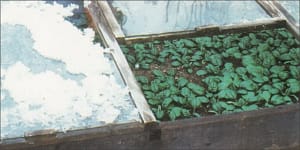Happy Pigs Really Do Taste Better

For ten years Alice Percy operated a commercial hog operation on her farm in Whitefield, Maine, becoming the largest certified hog producer in the state. Percy has mentored hog farming startups through the Maine Organic Farmers and Gardeners Association (MOFGA), and helped to develop the association’s Raising Organic Pigs fact sheet. She has presented workshops on organic hog husbandry at MOFGA events and the annual NOFA Summer Conference. Percy currently works as the manager of the Organic Growers Supply division at Fedco Seeds and served on the board at MOFGA.
The following is an excerpt from Happy Pigs Taste Better by Alice Percy. It has been adapted for the web.
Few Americans have a direct connection to how their food is produced anymore, or think much about where their BLT came from, but most are sentimental to some degree about animals and want them to be treated well. Most also want their great-grandchildren to have water to drink, food to eat, and air to breathe. When confronted with the negative impact of the modern livestock industry on the environment and animal welfare, some consumers will absolutely go into ostrich mode rather than change their buying habits, and some will decide to avoid meat entirely.
Others, though, learn about alternative ways of getting meat to the table and decide either to raise their own meat or to support producers who are dedicated to environmental protection and animal welfare—and they understand that those principles come at additional financial cost.
This demand creates a genuine opportunity to start creating a better system.
Alternative methods of hog production (including certified organic, pasture based, and other extensive methods) on homesteads and family-scale farms benefit the farmer, the hog, the environment, and the consumer. High-welfare hog production benefits the farmer because the product distinguishes itself on the market.
Competing in the mainstream markets as a small producer is most likely a nonstarting proposition, and definitely a losing game, especially if you are committed to maximizing animal welfare (the margins in mainstream production are too slim to allow this commitment). As a niche producer, however, you can exercise some control over your scale, your markets, and your profitability. The pig obviously benefits because it is allowed to be a pig (and a happy pig, at that!) instead of just a production unit. Like its ancestors, it gets to experience sunshine and free movement and exercise its natural instincts.
The environment benefits because small-scale farms are well adapted to composting manure instead of handling it as liquid effluent, turning farm “waste” into a resource rather than a contaminant. If you grow or purchase organic feed, the environment benefits doubly because your farm supports crop production practices that conserve soil quality and avoid toxic synthetic materials.
Consumers benefit from the satisfaction of a connection with the source of their food, the comfort of knowing that their bacon habit doesn’t come at the expense of animal welfare, and above all from an improved dining experience—happy pigs really do taste better!
Recommended Reads
Recent Articles
What’s so great about oyster mushrooms? First, you can add them to the list of foods that can be grown indoors! They are tasty, easy to grow, multiply fast, and they love a variety of substrates, making oyster mushrooms the premium choice. The following is an excerpt from Fresh Food from Small Spaces by R. J.…
Read MoreEver heard the phrase, “always follow your nose?” As it turns out, this is a good rule of thumb when it comes to chicken manure. Composting chicken manure in deep litter helps build better chicken health, reduce labor, and retain most of the nutrients for your garden. The following is an excerpt from The Small-Scale Poultry…
Read MoreIn her book, The Art of Science and Grazing, nationally known grazing consultant Sarah Flack identifies the key principles and practices necessary for farmers to design, and manage, successful grazing systems. This book is an essential guide for ruminant farmers who want to crate grazing systems that meet the needs of their livestock, pasture plants,…
Read MoreThis long-lived perennial legume is used for forage and erosion control. Kudzu is edible with many medicinal uses and other applications. Pollinators of all kinds love its prodigious lavender blooms!
Read MoreAre you ready to get a jump-start on the gardening season? With a cold frame, you can get started now. A cold frame harnesses the sun’s heat before it’s warm enough to let unprotected seedlings growing outside. Essentially, it consists of a garden bed surrounded by an angled frame and covered with a pane of…
Read More









